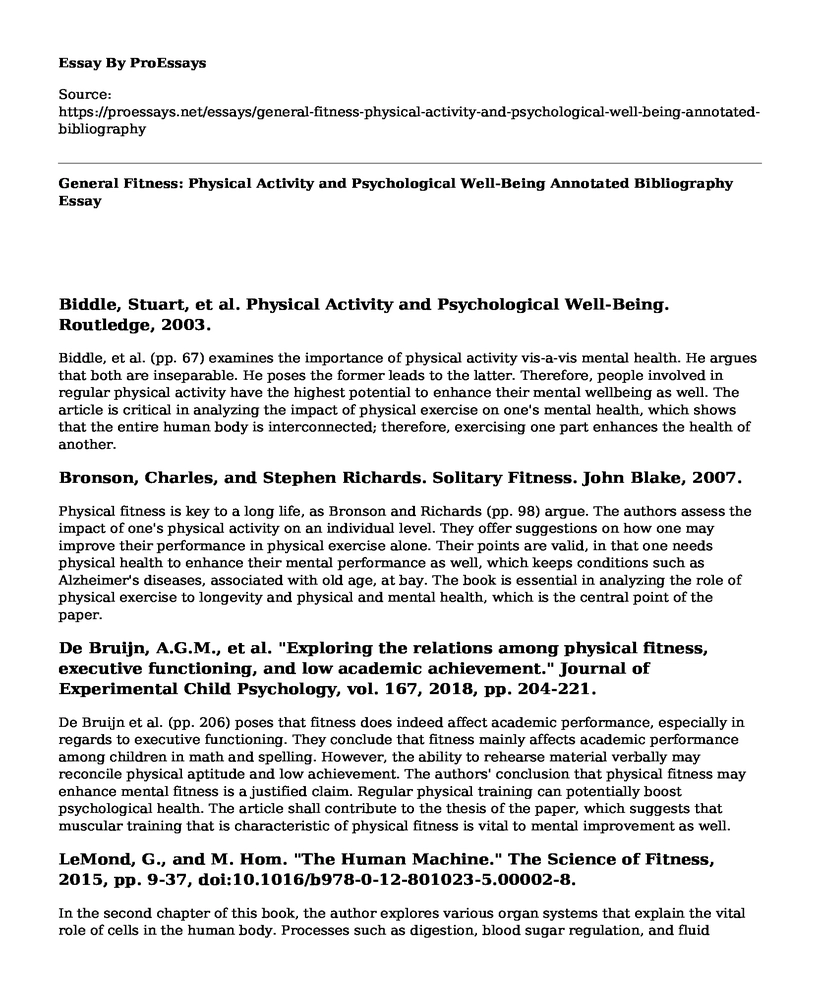Biddle, Stuart, et al. Physical Activity and Psychological Well-Being. Routledge, 2003.
Biddle, et al. (pp. 67) examines the importance of physical activity vis-a-vis mental health. He argues that both are inseparable. He poses the former leads to the latter. Therefore, people involved in regular physical activity have the highest potential to enhance their mental wellbeing as well. The article is critical in analyzing the impact of physical exercise on one's mental health, which shows that the entire human body is interconnected; therefore, exercising one part enhances the health of another.
Bronson, Charles, and Stephen Richards. Solitary Fitness. John Blake, 2007.
Physical fitness is key to a long life, as Bronson and Richards (pp. 98) argue. The authors assess the impact of one's physical activity on an individual level. They offer suggestions on how one may improve their performance in physical exercise alone. Their points are valid, in that one needs physical health to enhance their mental performance as well, which keeps conditions such as Alzheimer's diseases, associated with old age, at bay. The book is essential in analyzing the role of physical exercise to longevity and physical and mental health, which is the central point of the paper.
De Bruijn, A.G.M., et al. "Exploring the relations among physical fitness, executive functioning, and low academic achievement." Journal of Experimental Child Psychology, vol. 167, 2018, pp. 204-221.
De Bruijn et al. (pp. 206) poses that fitness does indeed affect academic performance, especially in regards to executive functioning. They conclude that fitness mainly affects academic performance among children in math and spelling. However, the ability to rehearse material verbally may reconcile physical aptitude and low achievement. The authors' conclusion that physical fitness may enhance mental fitness is a justified claim. Regular physical training can potentially boost psychological health. The article shall contribute to the thesis of the paper, which suggests that muscular training that is characteristic of physical fitness is vital to mental improvement as well.
LeMond, G., and M. Hom. "The Human Machine." The Science of Fitness, 2015, pp. 9-37, doi:10.1016/b978-0-12-801023-5.00002-8.
In the second chapter of this book, the author explores various organ systems that explain the vital role of cells in the human body. Processes such as digestion, blood sugar regulation, and fluid balance show the blood cell performing its function for the enhancement of the body. LeMond and Hom (pp. 25) conclude that the blood cell, as a constant in every human body part, is a beneficiary of physical fitness; and its effects are present in every body part. This piece is a positive contribution to the argument of this paper - physical fitness and mental fitness develop mutually.
Potkanowicz, Edward S. "The Role of Physical Activity in Cognitive Fitness: A General Guide for Community Programs." Enhancing Cognitive Fitness in Adults, 2011, pp. 239-248.
According to Potkanowicz (pp. 245), physical exercise is tied to motivation to push further beyond one's limits. It enhances long-term sticking to set rules and goals. The author takes a different route from the other studies described above. He shows the role of strengthening one's mental strength first, which should influence the performance of the physical body. Motivation is indeed a key factor in the achievement of one's exercise goals. Nonetheless, this piece shows the relationship between physical performance and mental health, which is evidence of a coexistence that cannot be separated.
Perez-Bey, Alejandro, et al. "The Role of Adiposity in the Association between Muscular Fitness and Cardiovascular Disease." The Journal of Pediatrics, 2018.
Perez-Bey et al. (pp. 213) argue that body mass index (BMI) is directly related to the risk of cardiovascular disease in both children and adolescents. Muscular fitness influences BMI, which means that increased fitness reduces the risk of CVD. As aforementioned by the other researchers, physical fitness is directly proportional to such fitness in other parts of the body. The article is critical because it shows that all parts of the body are pertinent to physical exercise, and benefit just as much from it.
Cite this page
General Fitness: Physical Activity and Psychological Well-Being Annotated Bibliography. (2022, Jun 20). Retrieved from https://proessays.net/essays/general-fitness-physical-activity-and-psychological-well-being-annotated-bibliography
If you are the original author of this essay and no longer wish to have it published on the ProEssays website, please click below to request its removal:
- Essay on Role of Family in Bereavement
- Society Killed the Teenager Essay Example
- How to Establish Democratic Schooling in Rural Area Schools Paper Example
- Research Paper on Childhood Amnesia: A Theoretical Explanation
- Culturally Responsive Instruction in U.S Schools: Essential for a Diverse Society
- Paper Example on Early Years Foundation Stage
- Essay Example on Cyberbullying: Analysis and Critical Interpretation







